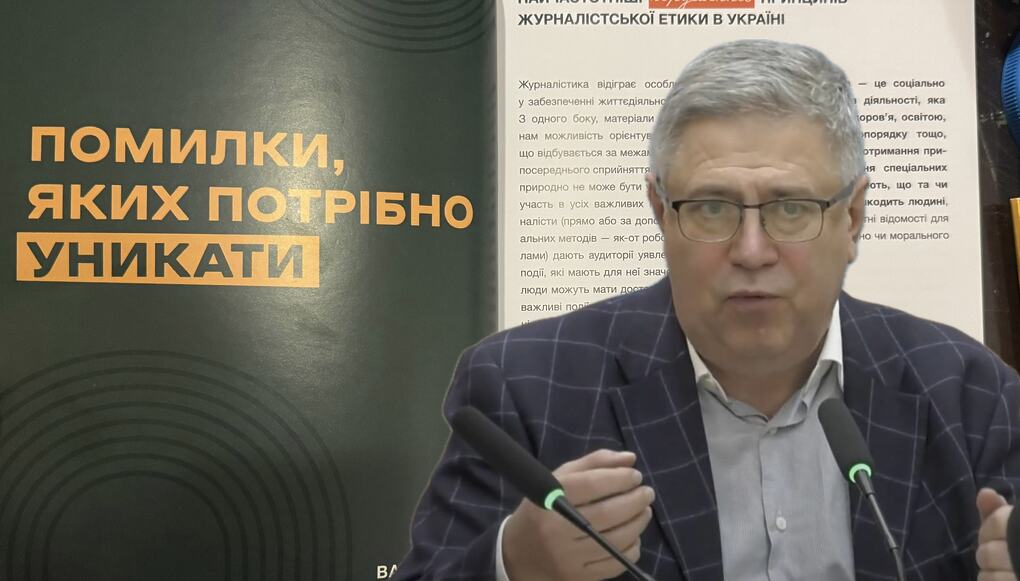
Speech by Valeriy Ivanov, Doctor of Philology, Professor, President of the AUP, at the presentation of the «Workshop on Journalistic Ethics» by the Commission on Journalistic Ethics.
I thank my colleagues. First of all, I would like to emphasise the importance of adhering to professional standards during the war. In fact, they should always be observed, regardless of the state of the country and the media. But when the media during a war either help the public understand what is happening or, on the other hand, hinder it, it becomes especially important.
Calls to help the state through direct propaganda are extremely harmful. If the media start to engage in propaganda, they cease to be real media. Of course, propaganda may be necessary in times of war, but it should be done by the state, not by independent media. Otherwise, they lose their credibility and audience. People can be deceived only once, and then they will simply stop reading or watching such sources.
I saw one of the most striking examples a few weeks before the occupation of Bakhmut. I went there with my Portuguese colleagues. Children were riding bicycles under fire, and fortunately, later it was decided to evacuate the children. Now there are no children in the city, which is right and safe for them. The second thing that struck me was that my colleagues and I found a place where people were going to get water, and these people almost beat us up, they pushed us away and chased us away. This is an example of the citizens that Ukraine has lost. Of course, there are historical and other reasons, but I think the media also played a role. They did not give an adequate picture that would take into account the interests of these people.
The media should focus on the entire audience, and the audience of the Ukrainian media is the entire population of Ukraine, as well as those Ukrainians who are now abroad. So, Mr Andriy, don't be offended if I argue a little bit: we should focus not only on graduates of journalism schools. After all, many journalists came to the profession without the appropriate education and then set their own «rules of the game» instead of accepting our professional standards. There should be zero tolerance for those who deliberately post falsehoods, clickbait and fakes for the sake of «hype», because they undermine the credibility of all Ukrainian media.
Mr Otar Dovzhenko mentioned a study where TV channels proved to be more popular than traditional media, and the question arises as to why we should stick to standards. Let me give you an example from Germany: my good friend Werner Teinka, publisher of the Frankfurter Allgemeine Zeitung, used to be worried about new media. But now he is convinced that the audience appreciates a quality approach: they check facts, admit and correct mistakes. People trust these publications, and that's why they remain popular. In Ukraine, unfortunately, not everyone understands that journalistic standards are not only legal rules, but also ethical norms that change rapidly and depend on circumstances.
I am quite critical of attempts to set professional standards at the legislative level. After all, they can change depending on the situation. During the war, for example, illustrations related to the wounded or dead are treated quite differently than before the war. All this should be determined by the professional community. If we compare Ukrainian media with Western media, we will see that the Ukrainian media still have to make an «existential choice» and finally turn their backs on Western principles of informing, rather than Soviet propaganda. Of course, there are problems there too, but our problems are on a completely different scale.
You can watch the video of the presentation on the Facebook page of the Commission on Journalistic Ethics
https://www.facebook.com/watch/live/?ref=watch_permalink&v=938848605061771&t=0
Summary
This text is a speech by Valeriy Ivanov, professor and president of the Academy of Ukrainian Press, on the importance of adhering to journalistic standards, especially in times of war. The author emphasises that propaganda should remain the prerogative of the state, and the media should maintain the trust of the audience through objective reporting. He gives examples of how failure to adhere to standards and a shift to propaganda can drive people away from Ukrainian media, and draws attention to the difference between professional standards and legal norms. The overall message is that the media should make every effort to remain credible, reliable and ethical, especially in times of war.